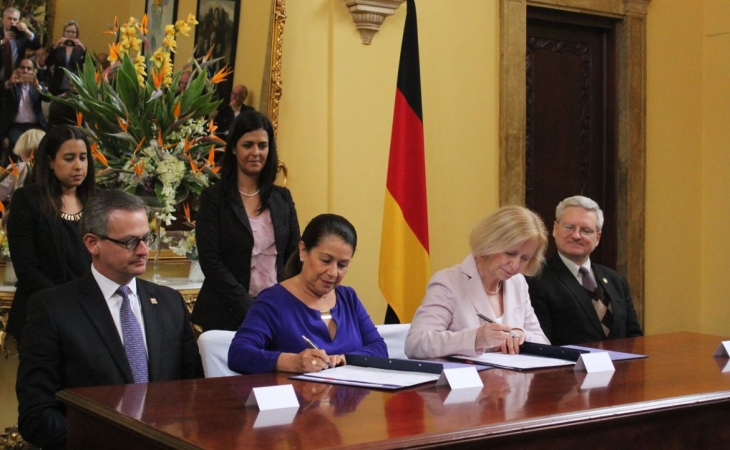Six out of the ten projects approved by the German Federal Ministry of Education and Research (BMBF, its acronym in German) and the Ministry of Science, Technology and Telecommunications of Costa Rica (MICITT), were proposed by researchers from the University of Costa Rica (UCR).

The visit of Dr. Johanna Wanka (center), German Minister of Education and Research, in February 2016, allowed expanding the collaboration liaisons that the University of Costa Rica has with different German institutions.
CONARE).
Of these last two projects, one will be developed in CENIBiot of CeNAT and the other in the laboratory of the Airborne Research and Remote Sensors Program (PRIAS), also of CeNAT.
The selection of these projects evidences the quality of the research carried out at the UCR; 23 projects were initially submitted, which were evaluated by academic pairs to choose 15 submitted to MICITT and the BMBF. Of these, five were finally chosen from the UCR representing half of the total ten selected.
Of these five projects from the UCR, three correspond to teams of researchers from the Center for Research in Tropical Diseases (CIET) and the School of Microbiology, one corresponds to researchers from the Center for Research in Electrochemistry and Chemical Energy (CELEQ) and the School of Chemistry and another to the Center for Research in Cellular and Molecular Biology (CIBCM) and the School of Chemistry. (SEE TABLE)
Dr. Max Chavarría -Vargas, who won a project presented by CENIBiot, is also a professor at the School of Chemistry at the University of Costa Rica.
All the proposed projects should have a Costa Rican and a German team investigating the same topic, as funds finance only joint research and development projects. The MICITT finances the Costa Rican research teams while German teams are funded by the BMBF.
Both Costa Rican and German research teams will receive the funds requested and well justified, up to an approximate maximum of €100 thousand Euros, equivalent to about 60 million colones.
The German teams will receive funding for activities that include exchange of researchers, scientists and experts in order to promote research and experience exchange; also, for the organization of seminars, workshops, symposia and other types of scientific and technological gatherings, which are of mutual interest and have the purpose of promoting the interaction between institutions and research groups.
However, the research itself will not be financed, since what the BMBF intends is to strengthen the teams of scientists, so that they can compete for international funds to carry out their research projects.
As for the Costa Rican teams, the financing of these activities is contemplated, but an item is also included to carry out the research.
The projects will have a minimum duration of 24 months and a maximum of 36 months. Proposals of 24 months may receive an extension for 12 more months in exceptional cases.
In this call, four themes were defined within which the research projects had to be framed. One was the life sciences in research on infectious diseases in humans, bioeconomy and biotechnology. The other was on environmental research topics on climate, biodiversity and sustainable energy systems. A third topic was research on information and communication systems. Finally, the fourth included research on new materials with the use of nanotechnology.

This collaboration is one of the results of the visit of an official delegation from Germany headed by Dr. Johanna Wanka (third, left to right), Federal Minister of Education and Research, held in February 2016.
UNIVERSITY OF COSTA RICA PROJECTSTHAT WON FUNDS FROM BMBF-MICITT |
|||
|---|---|---|---|
|
Name of Project |
Costa Rican Researchers |
German Researchers |
Budget Approved |
|
Establishing a bilateral omics platform for future diagnostics of Clostridioides difficile |
César Rodríguez-Sánchez |
Jörg Overmann Leibniz-Institut DSMZ Deutsche Sammlung von Mikroorganismen un Zellkulturen |
₡34.535.746 |
|
Joint research initiative on the role of IL-38 as an immuneregulator in the tumor microenvironment in glioblastoma multiforme |
Javier Francisco Mora-Rodríguez, Rodrigo Mora, Steve Quirós, Esteban Chaves-Olarte, Warner Alpízar, Miguel Ángel Esquivel & Alejandro Blanco-Saborío |
Dra. Anne Régnier-Vigouroux Johannes Gutenberg Universität Mainz |
₡39.000.000 |
|
Emerging alphaviruses as causes of neglected infectious diseases in Costa Rica. Acronym: Alphanet |
Eugenia Corrales-Aguilar, Adriana Troyo, María Marta Piche, Andrés Moreira-Soto, Claudio Soto, Carlos Jiménez, UNA |
Jan Felix Drexler, Charité – Universitätsmedizin Berlin. Dr. Andrés Moreira-Soto, Thomas Jaenisch, University of Heidelberg. |
₡39.000.000 |
|
Natural compounds from Costa Rica: Molecular mechanism of action and chemopreventive potential against neurodegenerative diseases |
Alfonso García-Piñeres, Juan José Araya, Rebeca Campos & Renato Murillo |
Prof. I. Merfort, University of Freiburg, Prof. S. Günther, University of Freiburg, Prof. M. Lämmerhofer, University of Tübingen |
₡38.999.706 |
|
Graphene based lab-on-chip sensors for the detection and characterization of bacterial pathogens |
Roberto Urcuyo- Solórzano, César Rodríguez, Leonardo Lesser of UCR. Caterina Guzmán & Giovanni Sáenz of UNA. |
Dr. Klaus Kern, Max Planck Institute for Solid State Research |
₡39.000.000 |